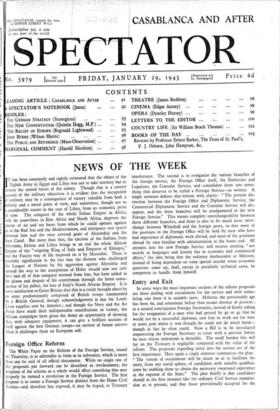Entry and Exit
In some ways the most important sections of the reform proposals are those dealing with recruitment for the service and with stimu- lating exit from it in suitable cases. Hitherto the pensionable age has been 6o, and retirement before then meant absence of pension ; as a natural consequence Foreign Secretaries, instead of firmly asking for the resignation of a man who had proved by 4o or 45 that he would not be a successful diplomat, sent him to work out his time at some post where it was thought he could not do much harm— though in fact he often could. Now a Bill is to be introduced empowering the Foreign Secretary to retire with a pension before 6o men whose retirement is desirable. The small burden this will lay on the Treasury is negligible compared with the value of the reform. The proposals regarding entry into the service are of the first importance. Here again a single sentence summarises the plan: " The system of recruitment will be recast so as to facilitate the entry, from any social sphere, of candidates with suitable qualifica- tions by enabling them to obtain the necessary vocational experience at the expense of the State." The plan briefly is that candidates should in the first instance take the ordinary Civil Service examina- tion as at present, and that those provisionally accepted for the Foreign Service should then undergo a period of training abroad at the expense of the State, culminating in a further examination in the special subjects the candidate has chosen. If successful in that he will be given a year's training in this. country, " part of which will be spent in the Foreign Office and part in getting a grounding in economic, commercial and social questions." The programme as a whole promises a great advance in both democratisation and efficiency, and Mr. Eden is to be warmly congratulated on it. •



























